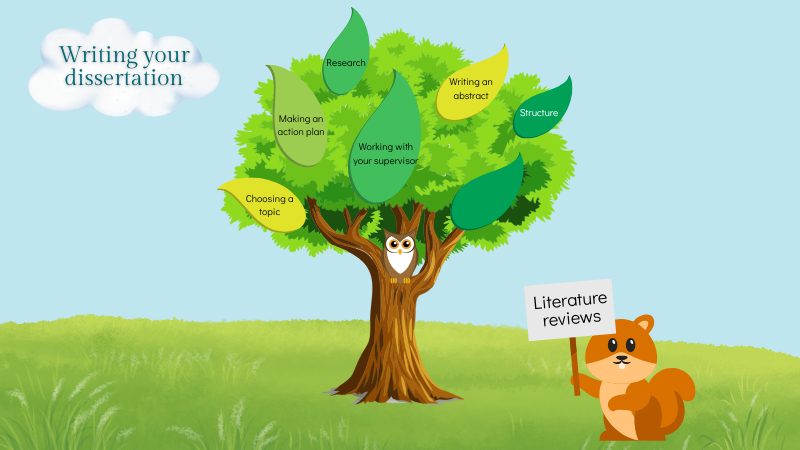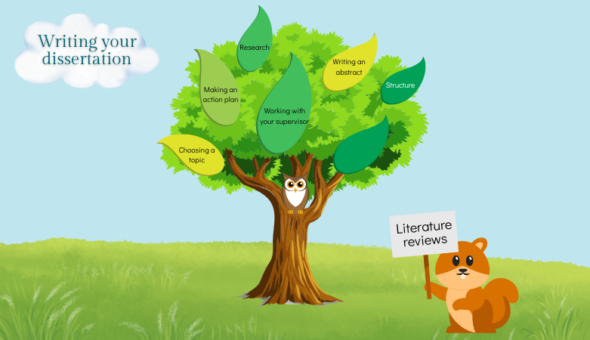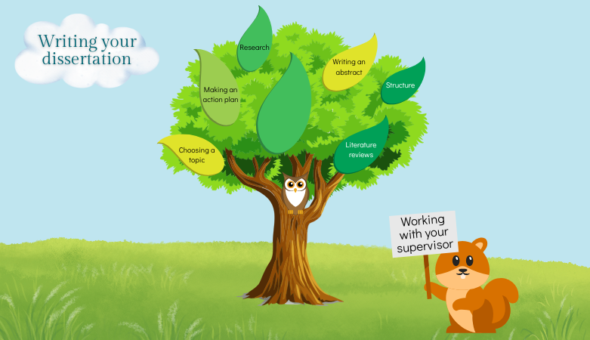A literature review is designed to demonstrate your knowledge and understanding of the academic literature on a specific topic. A literature review also includes a critical evaluation of the material.
The three main objectives of a literature review are to:
- Identify and examine relevant research, theories and evidence
- Conduct a critical evaluation and discussion of this content
- Help you identify a gap or ongoing problem related to current research that justifies further investigation
The literature review is a significant part of your dissertation and you need to ensure you allow plenty of developmental time.
The purpose of a literature review
The literature review provides the platform to dig deeper into your chosen focus topic. It will help you develop a critical approach, refine your topic, and frame your research questions. Your literature review should enable you to find out what research has already been done and identify what is unknown or problematic within your topic.
In a literature review, it's good practice to:
- Summarise and analyse previous research and theories
- Identify areas of controversy and contested claims
- Highlight any gaps that may exist in research to date
Conducting a literature review - practical steps
When you start your literature review, you might feel overwhelmed by the amount of research reading you may have to do. A useful way to bring this under control is to focus on different parts of the review to help you plan, develop, refine and write. Here are a few prompt questions you can use or adapt when you build your literature review.
1. Demonstrate your knowledge and familiarity in your subject/topic
- What are the significant and established themes of your subject/topic? What are the relevant sources? Why?
- Are they reliable sources? Why?
- What are the methods of research and are they suitable/reliable?
2. Critical analysis
- What are the strengths of the themes of your chosen topic? What evidence have you found that supports this?
- Where are the gaps or weak areas in the literature? What are they?
- Are there areas of controversy? What are they?
3. Summarising your thoughts
- What do you think? Why do you think that? (Based on the evidence you have gathered)
- How does your project/research question link into this? Why does it need to be undertaken? (Try to give an explicit statement for your reader)
- What are the most appropriate research methods to use and why?
4. Structuring a literature review
- What are the main themes of your project/dissertation? What order do you need to use to explain this to someone else?
- What is the scope/limits of your project/dissertation?
- What are the recent developments? Are they significant? Why?
Literature review top tips
The University of Edinburgh has produced an excellent set of top tips for a literature review. We recommend reviewing this as part of preparing for your literature review.
Literature review checklist
Use this checklist to ensure you're covering all the bases in this key section of your dissertation:
| I have... | Done |
| Shown why my topic is relevant | |
| Displayed my knowledge of the field by citing a range of academic sources | |
| Used suitable sources (not Wikipedia) | |
| Divided my literature review into sections | |
| Organised the subsections logically | |
| Organised the sources within each subsection logically | |
| Demonstrated my understanding by summarising and including comments | |
| Shown how different sources are linked to each other | |
| Shown contributions of previous work | |
| Shown limitations of previous work, where appropriate | |
| Shown a chain of development | |
| Identified a niche for my research, by indicating a gap or showing how I will extend previous work | |
| Shown clearly how my research will fill this niche | |
| Included a citation for any information taken from a source | |
| Cited correctly | |
| Checked that my list of references matches my citations | |
| Checked that my list of references includes all the necessary information for each entry |
Hopkins, D. and Reid, T., 2018. The Academic Skills Handbook: Your Guide to Success in Writing, Thinking and Communicating at University. Sage.
Related blog posts
We have a number of blog posts about writing your dissertation. Make sure you check these out so that you're ready to get started:
- Organising your literature review
- Making the most of expert and peer support
- Choosing a topic
- Making an action plan
- Working with your supervisor
- Research (developing your research question, creating your working title and developing your research proposal)
- Structuring your dissertation (including contents, sections, and designing an effective structure)
- Writing an abstract
Further support
If you'd like some further support on writing your dissertation, we offer 1:1 tutorials both online and in-person. Tutorials are available throughout the summer, and slots become available 14 days in advance. You can see what's available, and book a tutorial, in MySkills.
Respond



